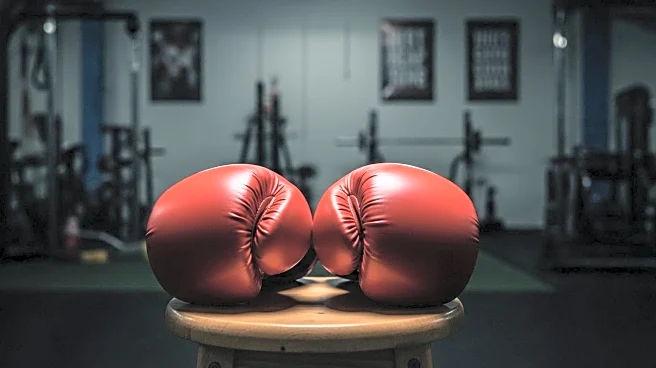What's Happening?
Gennady Mashianov, a renowned Russian boxing coach, has provided insights into the mental state of Bakhodir Jalolov, a two-time Olympic champion from Uzbekistan. Jalolov recently secured a victory over Russian Vitaly Kudukhov, but Mashianov notes that Jalolov has not fully adapted to the professional boxing scene. Despite his physical fitness, Jalolov struggles with mental pressure, which affects his performance. Mashianov believes Jalolov should have transitioned to professional boxing earlier, but national interests kept him in amateur boxing for two Olympic cycles. Jalolov has had two professional fights since the Olympics, with scheduled bouts in Canada and the USA falling through.
Why It's Important?
Jalolov's transition from amateur to professional boxing is significant as it highlights the challenges athletes face when shifting competitive environments. His mental struggles under pressure could impact his career trajectory, affecting his potential to become a leading figure in professional boxing. This situation underscores the importance of mental resilience in sports, which can be as crucial as physical prowess. Jalolov's experience may influence how future athletes approach their transitions, emphasizing the need for psychological support alongside physical training.
What's Next?
Jalolov's future in professional boxing will depend on his ability to overcome mental challenges. Continued support from coaches like Mashianov could help him adapt and thrive in the professional arena. Observers will be watching his upcoming fights to see if he can manage pressure better and improve his performance. Success in these areas could solidify his status as a formidable professional boxer, while failure might necessitate a reevaluation of his training and mental preparation strategies.
Beyond the Headlines
Jalolov's situation raises broader questions about the role of mental health in sports. As athletes face increasing pressure to perform, the need for comprehensive mental health support becomes more apparent. This case could prompt discussions within the sports community about integrating mental health resources into training programs, potentially leading to a shift in how athletes are prepared for high-stakes competitions.









